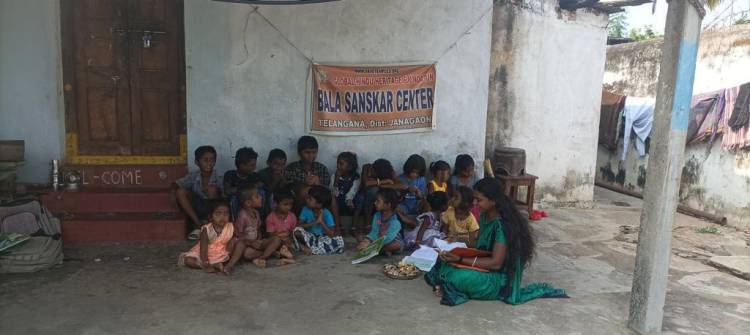[GHHF] Bala Samskar Kendras in Telugu States – learned about 14th Century Poet Vemana and his highly popular moral poems.
 14th Century VEMANA quote:
14th Century VEMANA quote:
The raindrop that fell in the shell became a pearl, The one that fell in water merged with water,
Where there's devotion, there's bound to be fruit, Beloved of the Bounteous, Vema, listen!
There is no consensus among scholars about the period in which Vemana lived. C.P. Brown, known for his research on Vemana, estimates his year of birth to be 1652 based on some of his verses. Various sources say he was born in the fifteenth, sixteenth and seventeenth centuries.
Global Hindu Heritage Foundation is very happy to inform you that we have started more than 160 Bala Samskar Kendras with the goal to impart the richness of ancient yet modern knowledge to the next generation to ensure the values of Sanatana Dharma. Not only do we talk about the richness of our culture, we also talk about the great saints, Gurus, and spiritual leaders that have shaped Bharat. Some of our Bala Samskar Kendra students learned about poet Vemana who is very popular for his very short and moral poems easily understood even in the villages.
C. P. Brown who translated his poems into English, says, “These verses are chiefly of three classes: moral, satirical and mystic In the morals, many verses occur, breathing a spirit of devotion truly extraordinary in a Hindu. The satirical part is chiefly directed against the national religion and customs, particularly against Bramins. None of it is personal. The mystic portion is chiefly of use as exemplifying the powers of the language. The reveries contained in this chapter are of a strangely abstruse nature and furnish a remarkable instance of a powerful mind searching for the light of truth which is lost in the darkness of heathen ignorance.”
Vemana was Telinga to the Jangama community. Brown says this was in his original history of Yogi Vemana. Vemana was a Vedic scholar and a great yogi in Achala Siddhartha.
Vemana was believed to be born in Gandikota, Kadapa district in Andhra Pradesh.
Vemana satakam was composed by “Kumaragiri Vemareddy” popularly known as Yogi Vemana, a 14th-century Telugu poet. He used simple colloquial language in his poems with native Idioms. A poet of the people, a philosopher of equality, and a fighting saint, his poems were a direct comment on the social structure at that time, which are relevant even to contemporary society. His satakas are known by his name as Vemana Satakam.
The meter chosen by Vemana for his poetry is “Ataveladi (which literally means danseuse). The structure of his poems is of 4 lines, with the last line being “Viswadabhirama Vinura Vema” –a chorus, which meant “The beloved of Vishwada, Listen O Vemana!!”
His specialty is the Chaatu padyam, a genre of poetry – poems with hidden meaning. So high was the regard for Vemana that a popular Telugu saying goes 'Vemana's word is the word of the Vedas'.
1)annidhaanamulanu nannadhaaname goppa
kannathallikaMte ghanamulEdhu
ennagurunikanna nekkudu lEshayaa
vishvadhaaBhiraama vinuravEma
There is nothing equal to giving food to a hungry man; no one greater than one's mother, and no one worth respect more than one’s teacher. These are eternal truths
2 elukatholunudechchi yEdaadhi vuthikinanalupu
nalupEgaani thelupuraadhu
koyyabomma dhechchi kottinaAObalukunaa
vishvadhaabhiraama vinuravema.
A mouse's skin doesn’t whiten even if washed for a year. A wooden toy doesn’t speak even if beaten up. Thus, it is not possible to change the intrinsic qualities of someone.
3. poojakanna neMcha budhdhipradhaanaMbu
maatakanna neMcha manasu dhtRDamu
kulamukanna migula guNamu pradhaanaMbu,
vishvadhaaBhiraama vinuravEma.
More than the prayers, it is the intention that matters. Whoever big promises one makes, are meaningless if not kept. Also, it is a person’s nature that is more important than the caste he is born in.
4. aathmashudhdhi leni yaachaaramadhiyela?
Bhaandashudhdhi leni paakamela?
chiththashudhdhi leni shivapoojalelaraa?
vishvadhaabhiraama vinuravema.
Any work without conviction is a waste. Food cooked in unclean vessels is not consumable. A prayer not done wholeheartedly is meaningless.
WE NEED YOUR HELP
We appreciate it if you can help in hiring more people who can go to these villages to do Ghar Waapasi. We have employed 24 (twenty) people so far. More people we hire more villages can be covered to welcome them back and also create Chaitanya (Awareness) among the students and villagers.
1) Donate any amount to help the Dharma Pracharaks to work at the ground level.
2) Sponsor one Pracharak: In order to expand our base and hire one Pracharak, it would cost approximately $3000.00 per year. We have five anonymous donors who sponsored Assistants.
DONATIONS
PayPal Method: To donate visit our website: savetemples.org. Click on the Donate button, then press the Purpose category, and select the General Donation category.
By Check: Or you can send a check payable to GHHF, It is tax-deductible
By Zelle: ghhfusaorg@gmail.com
RUPEES, if you would like to contribute to rupees, please either call or send an email. We will call you back to give you the required information
For more information, send an Email: to ghhfusaorg@gmail.com.




















 Urgent support needed for Bangladesh Hindus
Urgent support needed for Bangladesh Hindus 







